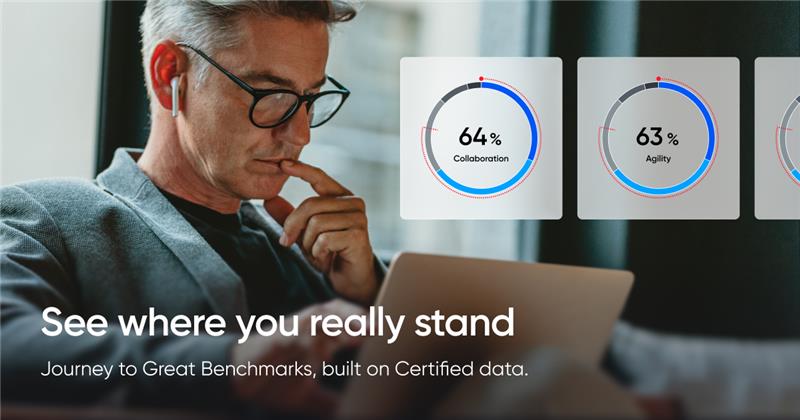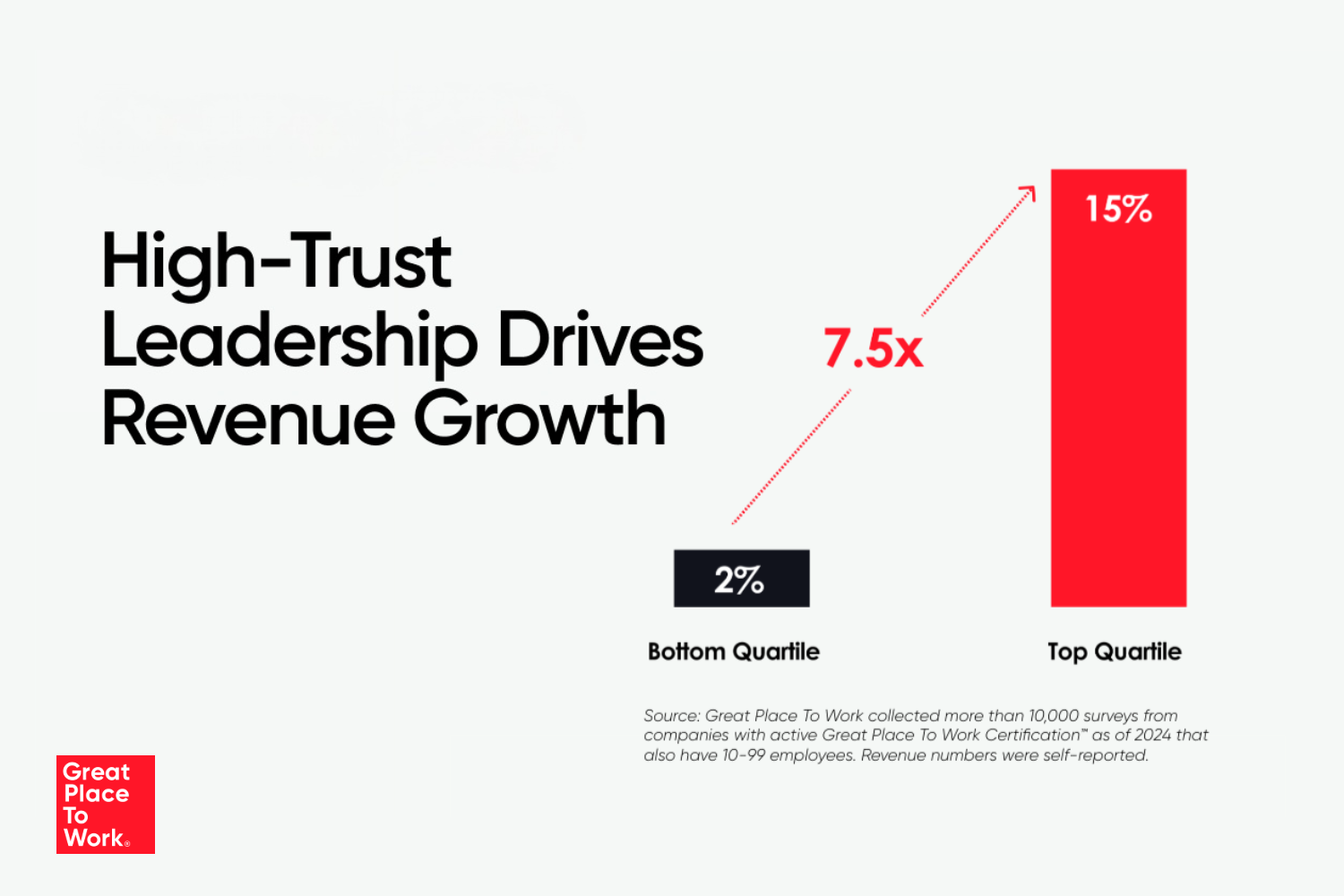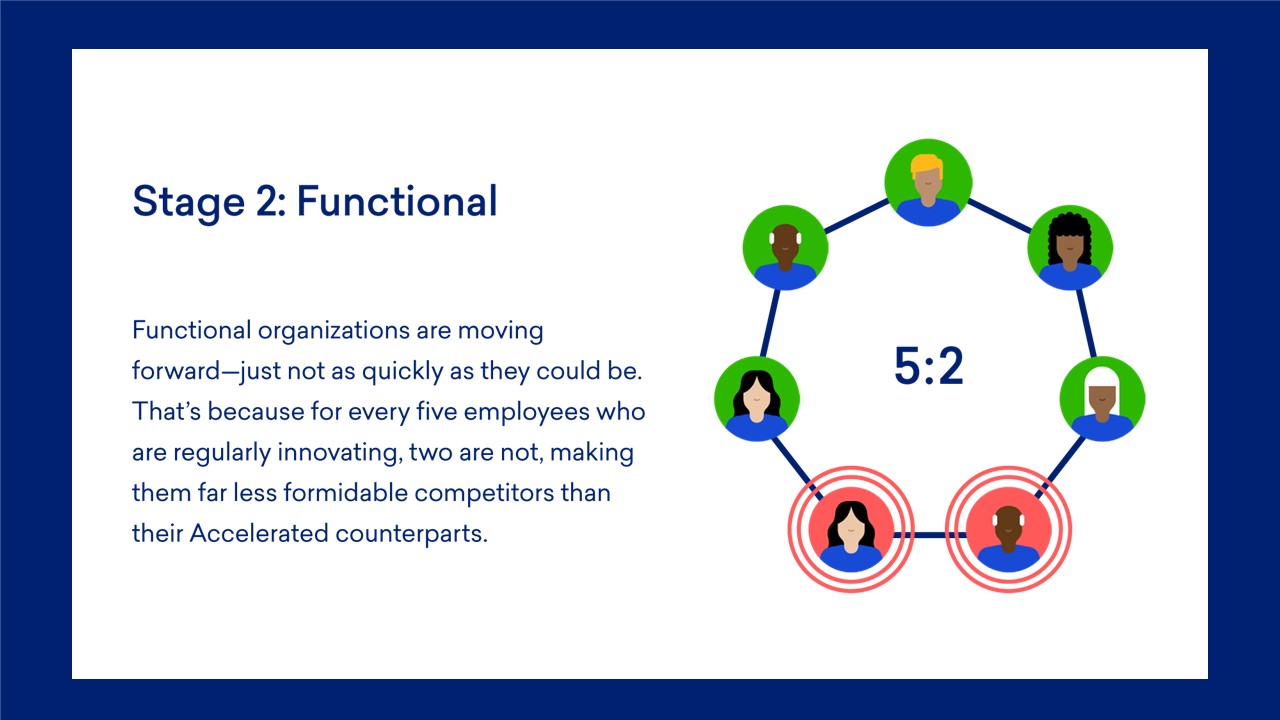AI (Artificial Intelligence), Innovation, Trust
Edelman’s latest Trust Barometer shows growing resistance to innovation. Here’s how you can measure if your workforce is ready for change.
Don’t assume your audience is ready for something new, whether that audience is employees, consumers, or a mix of both.
Edelman’s 2024 Trust Barometer shows growing distrust around innovative ideas and new technologies, from vaccine advances to artificial intelligence. In an online survey of over 32,000 respondents, now in its 24th year, Edelman found people are twice as likely to say innovation is poorly managed versus well managed — 39% compared with 22%.
While the report found that business is the most trusted institution to make sure innovation is safe and accessible (compared to government, NGOs, and the media), no institution had more than 59% approval.
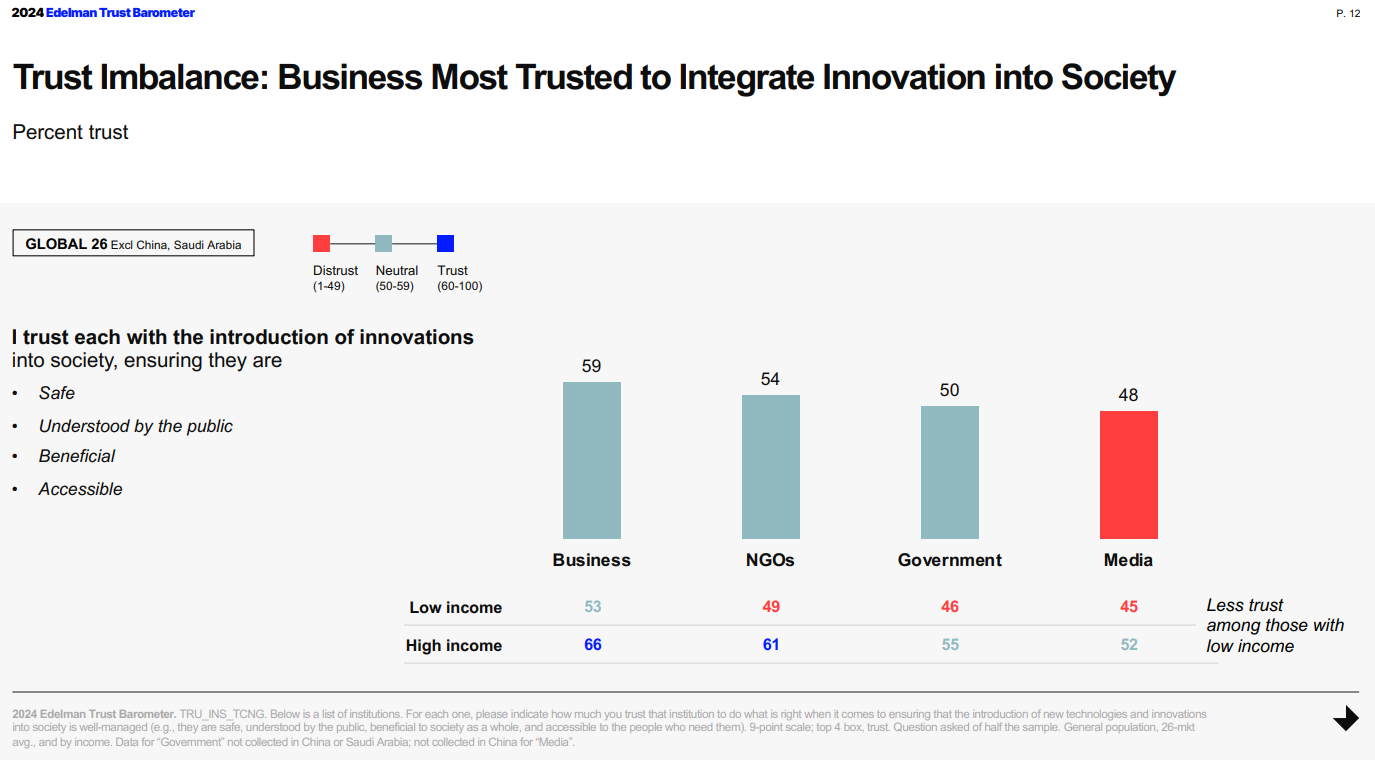
Resistance to innovation was shared by respondents across gender, age, and socioeconomic status. Trust was particularly lower in post-industrial countries like the U.S. and those in Europe.
Attend our annual company culture conference May 7-9, 2024
That lack of trust has big implications for whether new products and tools will be adopted or rejected.
In the global survey, people who said innovation was managed poorly were ready to reject innovation like AI (43%) and gene-based medicine (41%). Only 26% rejected AI when they said innovation was well-managed.
And the impact will be seen in the bottom line.
Companies with the highest “Innovation By All” metric have 550% faster revenue growth compared with companies that have a low score, according to Great Place To Work® research.
Facing a trust crisis
These findings support recommendations from Great Place To Work on the biggest mistakes threatening employee trust amid the rise of AI technology at work.
Top of the list? Don’t assume that everyone already trusts you.
“Business’s trusted status in society is not a given, and without active management could go the same way as trust in government,” wrote Richard Edelman, CEO of Edelman. “The trigger could be mismanagement of innovation, where past failures are still visible today.”
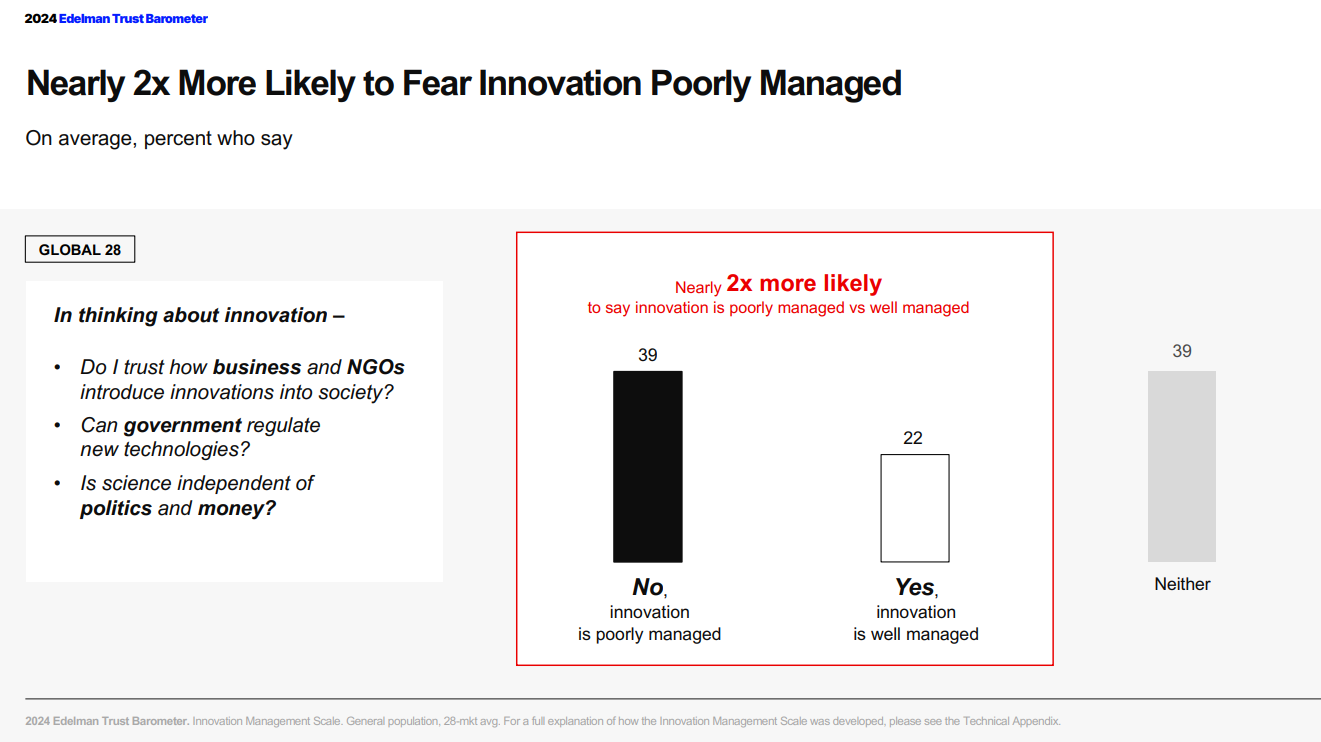
The innovation currently on center stage: AI.
“As you embark on GenAI, check how much confidence your employees’ have in their executives’ judgement,” says Marcus Erb, vice president of data and innovation at Great Place To Work.
Consider how confidence levels change across roles, departments, and personal identities.
“Weak confidence means more doubt, slower progress, and less enthusiasm shared with customers,” Erb warns.
Edelman’s data suggests that a good portion of your audience — whether customers or employees — don’t fully trust you. To find out your weaknesses, it will be crucial to survey and run employee listening sessions to uncover barriers to innovation.
A global trust crisis
Almost every country has more people who see innovation as mismanaged rather than well-managed.
In the U.S., 56% said innovation was mismanaged compared to 14% who believe the opposite. The number of respondents who say innovation is mismanaged is 17 points higher than the global average of 39%.
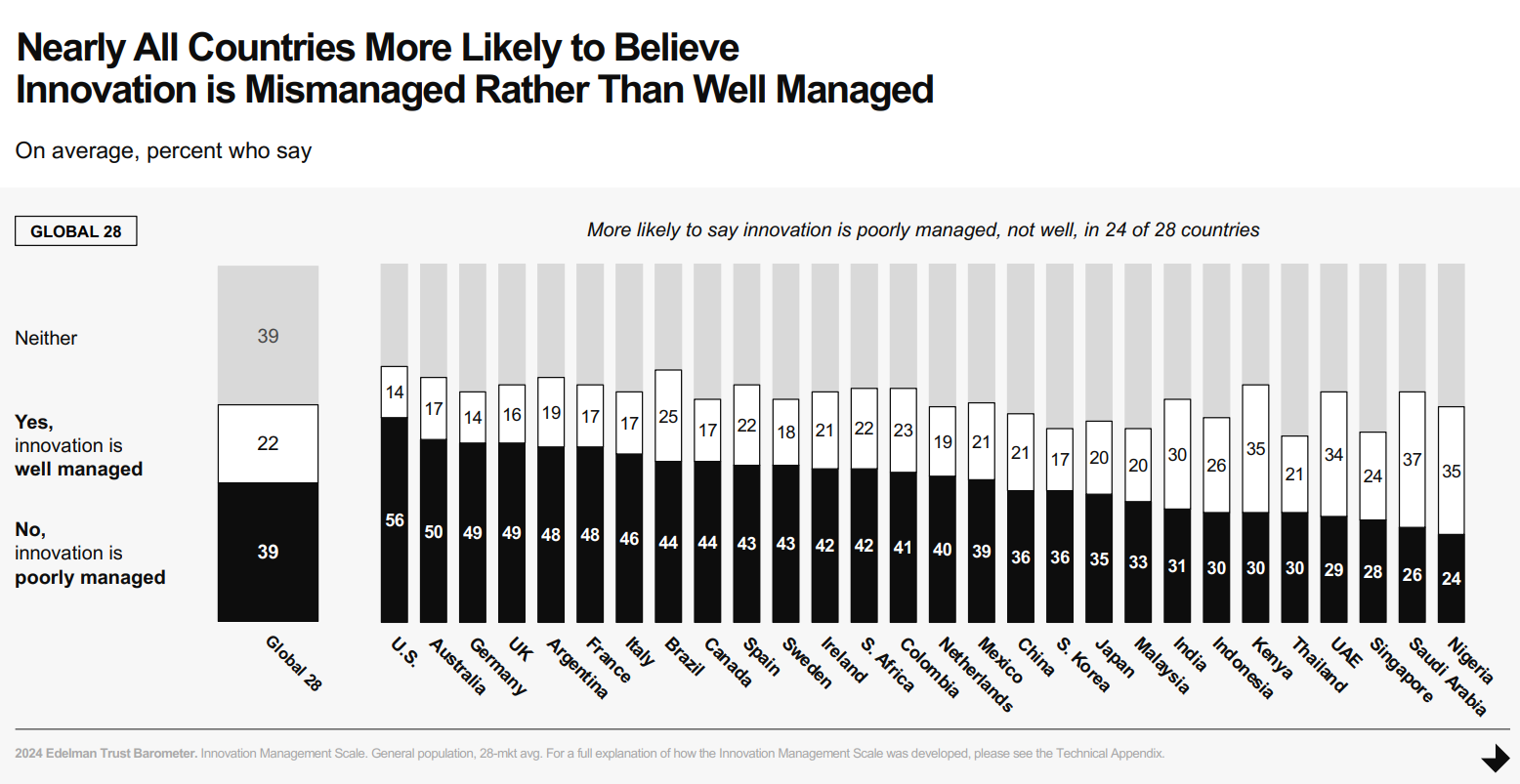
Respondents were more likely to say they trust their employer, with a global average of 79% saying they trust their company to be ethical and competent.
In the U.S., 79% of respondents said they trust their employer, a 3-point increase from the previous year.
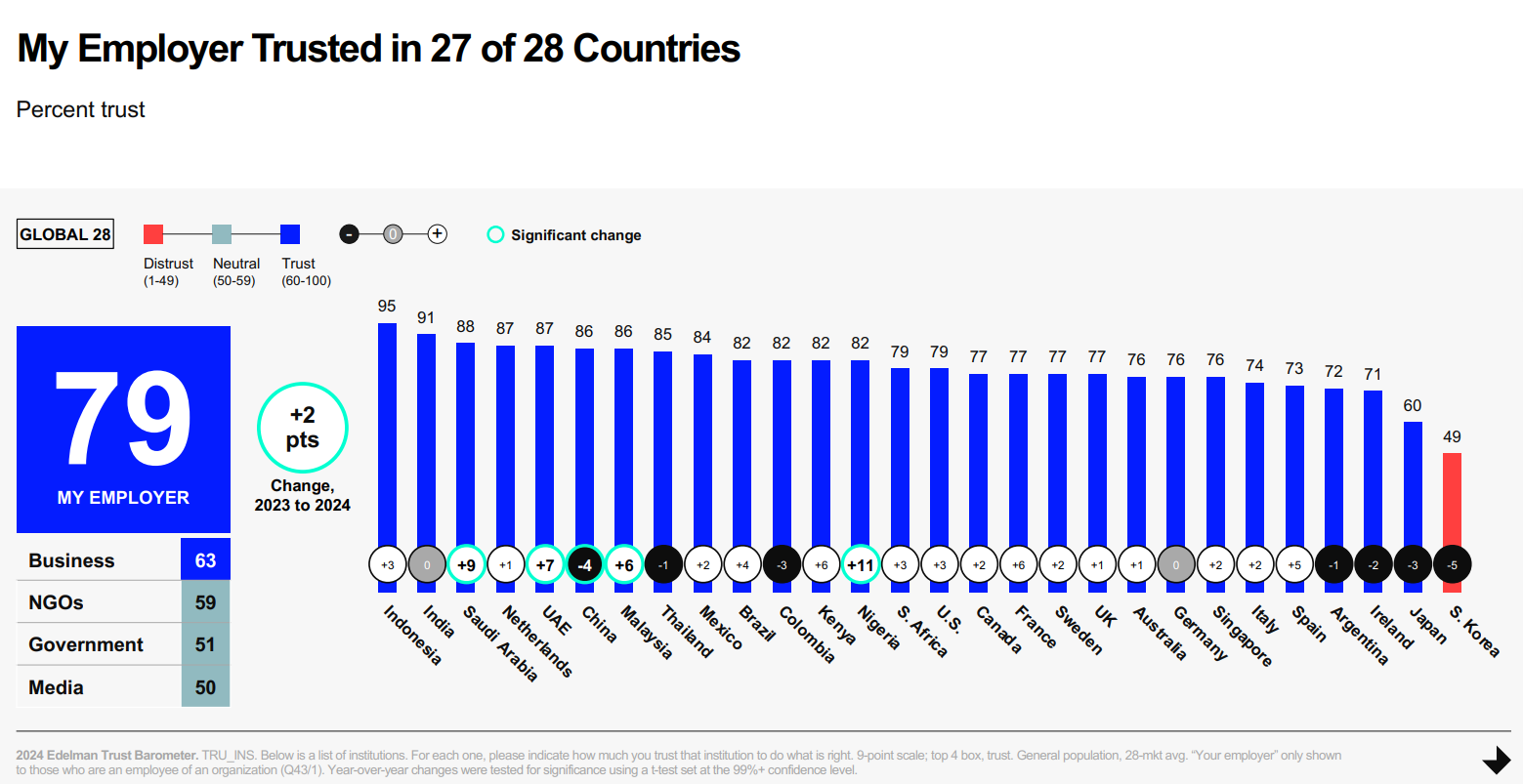
Every employer starts out with a certain amount of trust in the bank — a level of trust built over time with employees.
“Every interaction with your people is a chance to build that trust — or break it,” says Sarah Lewis-Kulin, vice president, global recognition at Great Place To Work. The more trust you have in the bank, the faster you will be able to adapt to the AI transition.
“The key to the best companies’ financial outperformance has always been their ability to gain the confidence and trust of their people,” Lewis-Kulin says. As an example, employees at the Best Workplaces™ are 47% more confident that their managers are ethical and honest, compared to a typical U.S. workplace, and 43% more confident in their ability to get truthful and direct answers to direct questions than at a typical workplace.
It’s these kinds of high-trust workplaces that create the conditions where companies on the Fortune 100 Best Companies to Work For® List outperform the market by a factor of three.
How to build trust
Edelman’s research identifies some common strategies to build trust and ensure new ideas can take off:
1. Listen to your people
Across all institutions, including business, government, media, and non-profit agencies, Edelman found that listening was a top three action to build trust.
That’s especially true in the workplace, where Great Place To Work’s research has shown the importance of employee listening to drive important outcomes.
Listening is the most important of the nine high-trust leadership behaviors and a key ingredient for increasing the speed of innovation at your company.
2. Offer employees a say in how new tools will be used
Edelman’s research found that audiences were much more likely to accept new innovation when they felt people like them had a lot of control over how these new tools would affect their lives.
One way to consider how employees feel included or disconnected from innovation is to examine your Innovation Velocity Ratio.
Great Place To Work’s proprietary platform can identify how many employees at your company are ready to innovate, versus the number of employees who experience friction.
Ask your employees if they feel included in decision-making that affects their jobs. The more agency and power employees feel they have, the more ready they will be to adapt to change.
3. Use your mission to inspire employees to grow
“Leaders might see AI as the ‘next big thing’ and focus all their attention on how that will affect their business,” says Julian Lute, senior strategic advisor at Great Place To Work. “They will need to give equal attention to communicating how AI will positively impact employees, and create opportunities for growth.”
It’s important for employees to feel a sense of purpose when dramatically changing their work environment. Great Place To Work research has found that even well-meaning organizations can struggle to connect frontline employees to a deeper purpose around their work. When that happens, these employees feel excluded from innovation, and innovation rates are slowed.
To overcome reluctance, Lute recommends finding ways to connect change to a desired final outcome — and lean into your mission as an organization.
You can’t assume that everyone in the organization understands how new technology like AI might connect to your company purpose.
“Talk about the new technology through your organization’s values, how it supports your purpose, and how it will benefit your customers and employees,” Erb says.
Edelman’s research again confirms the need for top executives in your company to speak openly with employees about the future. Almost two-thirds (62%) of respondents said they expect CEOs to manage changes occurring in society, not just in their business. In particular, respondents said it was important for CEOs to speak publicly about issues like future job skills (82%), ethical use of technology (79%) and the impact of automation on jobs (78%).
Get more insights
Learn more strategies from our workplace culture experts at our For All™ Summit, April 8-10, 2025 in Las Vegas, NV.




